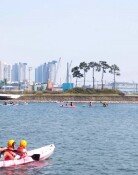Korean won hits 1,300-mark for the first time in 13 years
Korean won hits 1,300-mark for the first time in 13 years
Posted June. 24, 2022 07:54,
Updated June. 24, 2022 07:54
The Korean won closed at 1301.8 against the U.S. dollar at the Seoul Foreign exchange market on Thursday, up 4.5 from the previous day. Hitting the threshold of 1,300 mark per dollar, the local currency weakened to the lowest in 13 years since July 2009. It came directly after Fed Chairman Jerome Powell signaled the risk of the economy tipping into a recession at a hearing before the U.S. Senate Banking Committee.
The won-dollar exchange rate, which hovered at 1,200 won per dollar in January this year, soared by around 100 won in just five months. This comes from a rising likelihood of an “interest rate reversal,” where the U.S. benchmark interest rate is higher than that of Korea. The U.S. giant step of raising its benchmark rate since March has led to the trend of a strong dollar and a weak won, during which foreigners have retrieved money they invested in the Korean stock market out of concern for foreign exchange loss, further accelerating the won’s fall.
There are some good effects of the rate hikes, such as increased cost competitiveness of export companies. In the current context of a frozen economy, however, the weakened won will only burden businesses that import materials from abroad with higher costs. Airlines that pay for fuel in dollars are directly hit by the skyrocketing rate. Chief among the problems is a mounting burden of repayment with external debts of non-monetary institutions and private firms exceeding 190 billion dollars. The sharp jump in the won-dollar rate in a short period raised the risk of insolvency in the private sector.
This year, whenever there is a drop in the won’s value, the Ministry of Economy and Finance made a verbal intervention or sold the nation’s foreign-exchange reserves but to no avail. Korea’s Finance Minister Choo Kyeong-ho pledged “the government’s effort on the day to stabilize the currency market,” which fell short to forestall the won’s decline. The Bank of Korea brushed aside the concerns about capital outflows, mentioning the experience of capital inflows amid an interest rate reversal in the past.







